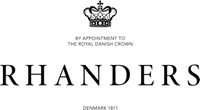At the outbreak of the Second World War, Randers Handskefabrik was the country's third largest glove manufacturer with around 70 employees. A profitable and well-functioning business with a well-established customer directory.
EXOTIC SUBSTITUTES
The war left its mark on the daily operations of Randers Handskefabrik. The German journeymen were called into military service and replacement goods gained traction. The limited import of raw materials meant that one had to resort to other and more exotic substitute goods. Calfskin from whole-milk calves worked, among other things, as a substitute for goat and lamb skin, and plaice skin was tried in production but was too fragile.

REJECTION & TRADE
Throughout the Occupation, Vejrum refused to do business with the German Armed Forces, and also emphasised to the wholesalers and own stores that they did not want to do business with the Armed Forces.

THE FEAR OF SABOTAGE
The German reaction to the glove factory's refusal in 1944 created fear in Vestergrave, where German officers were observed to be in the process circling the glove factory's yard, shortly after two other Randrusian companies: Chr. Junchers Konfektionsfabrik and Randers Tandhjulsfabrik had both been sabotaged by Danish resistance fighters. Fortunately, the fear was unfounded.

STAYING AFLOAT
Randers Handskefabrik managed to stay afloat during the Occupation. This is not the least because the factory's products were not subject to the Price Act. It was therefore possible to increase the price of the finished gloves as raw materials and wages became more expensive. The sale of gloves went well in the stores under the circumstances, which Vejrum described as "difficult to see the bottom of the order pile".

RHANDERS IN HISTORY
On April 9, 1940, Denmark was occupied by Germany and a 5-year state of emergency in Denmark began. As not decidedly involved in the war, Denmark had to see itself occupied and regulated under the influence of Germany, which had great significance for the possibility of importing raw materials and exporting Danish raw materials and finished goods, especially to Great Britain.
Poverty, disease and unemployment spread as a result of the decline in exports and earnings, but the Danish government reacted quickly with the regulation of the economy - including rationing of e.g. food and fuel, which had various necessities distributed to all parts of society. Due to the lack of import of raw materials Danish industrial companies were forced to test alternative raw materials in the development of products, i.a. fish skin, rabbit wool, yarn made of paper and fibres from nettles, and also in the kitchen you had to resort to alternative raw materials, such as seagulls and greens, which were otherwise considered weeds.







